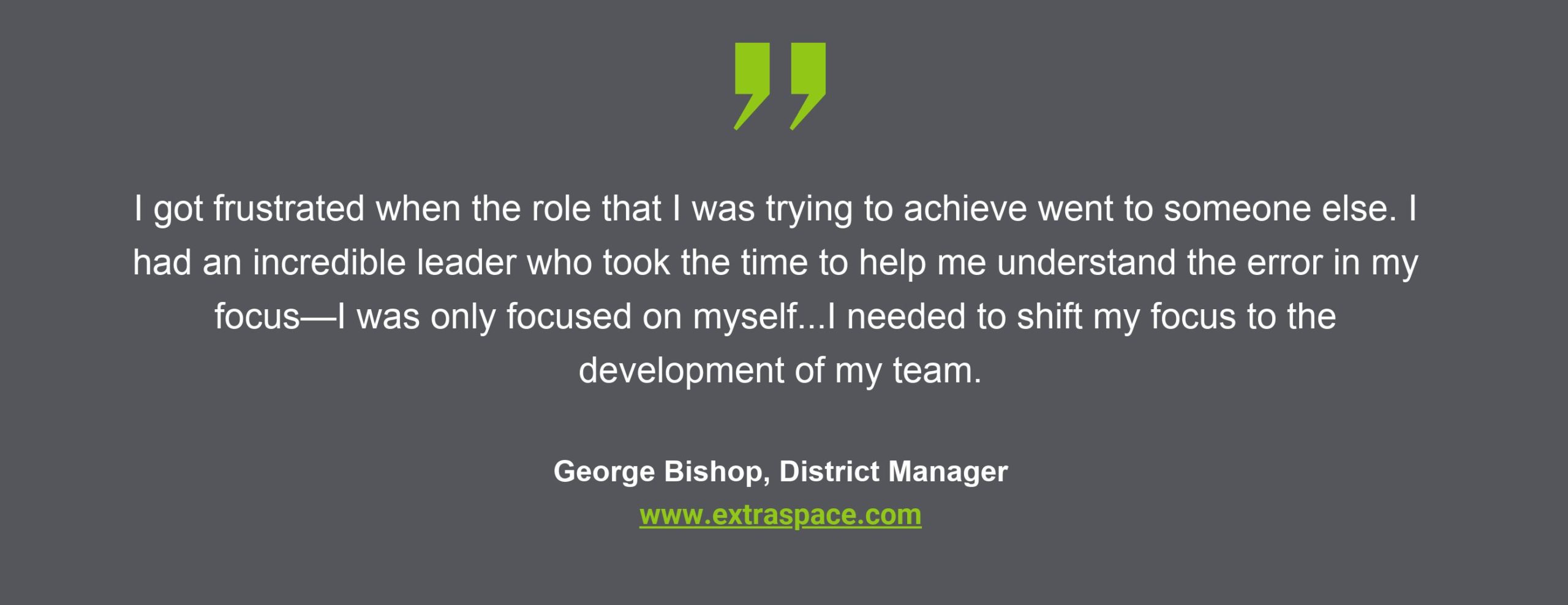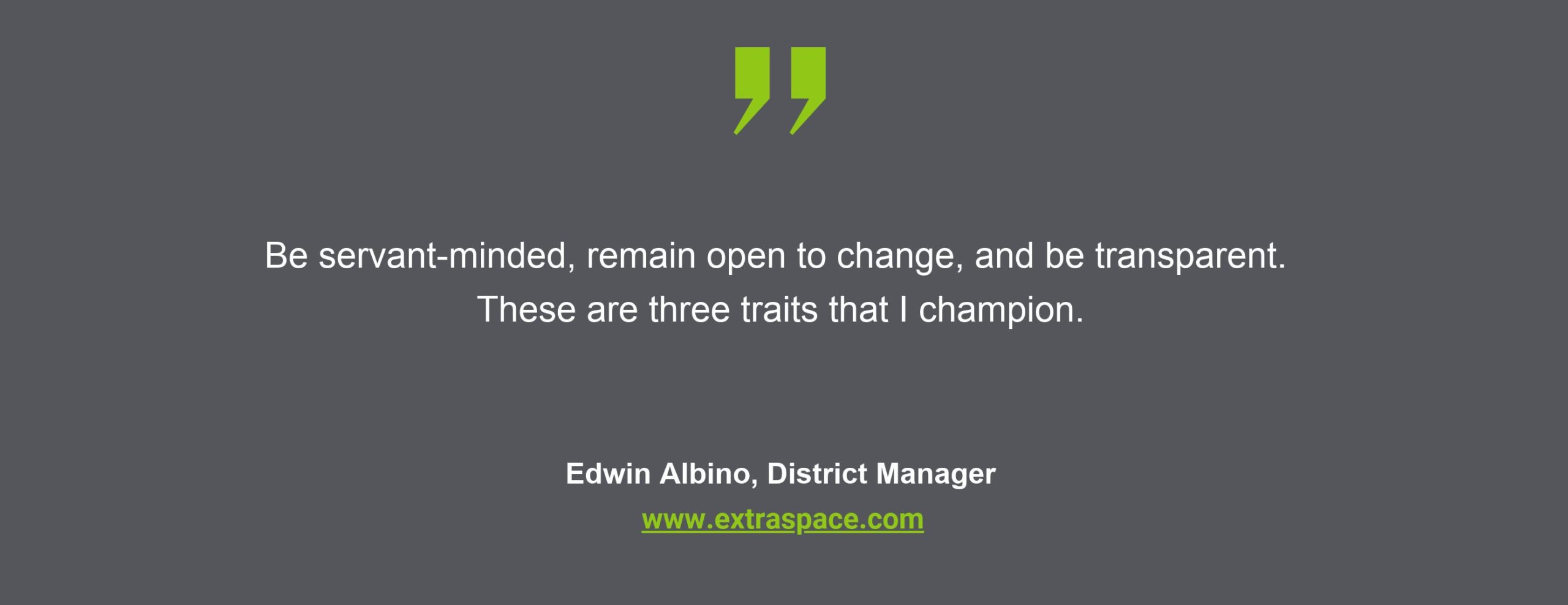Great leaders are hard to come by. And as we all know, a terrific boss can make all the difference between a positive, fulfilling work environment and one that their employees dread. National Boss’s Day is the perfect opportunity to express your appreciation to your boss, especially if they possess the qualities of being a great leader.
With that in mind, we asked Extra Space Storage team members to share their experiences—both as leaders and about leaders they look up to. Sharing their thoughts are:
- Andrew Reich, Call Center Service Team Lead
- Celes Talauega, Call Center Team Lead
- Eddie Albino, District Manager
- George Bishop, District Manager
- JR Messina, District Manager
- LaDante Collins, Assistant Manager
- Lamone Lewis, Store Manager
- Lisa Anthony, Call Center Team Lead
- Lu Scofield, Brand Marketing Specialist
- Sarah Simpson, Senior Recruiter
- Tammika Hernandez, District Manager
Q: In your experience, what makes a great leader?
Reich: A great leader is someone that helps guide and encourage coworkers, assists team members in understanding topics better, helps their team along the journey of learning, and always encourages them to succeed. A strong leader is someone that you can always lean on and helps with all issues.
Talauega: A great leader is first and foremost passionate. They lead their teams with enthusiasm and love what they do. Others want to follow because they see the fire within and will go above and beyond. They consistently strive to improve themselves, recognizing they are human, and inspire others to do the same. They are personable and honest, care deeply, and challenge directly and timely. They recognize what is special about each of their team members—their strengths, weaknesses, and pet peeves—and use this to bring the very best out in them. They also delegate appropriately and give credit where credit is due.
Collins: A great leader is someone who addresses matters in an appropriate way. A great leader doesn’t say “Follow me.” Instead, a great leader says, “Come with me. We’re going to win this together!”

Albino: A great leader needs to be transparent and execute with empathy. The leader shows that they care about the person and not just the performance trend that they provide. They practice open and consistent feedback to help manage the progress of the employee.
Bishop: The best leaders always put their team first, are authentic, and flexible in their approach. They take the time to learn how their team members are motivated and tailor their coaching approach accordingly. It is critical as a leader to be authentic and admit when mistakes are made. The team will know by the outcome if a specific plan didn’t work, but you can continue to earn their respect by admitting and learning from it. By always focusing on the continued development of the team, great things can happen for everyone involved.
Messina: Great leaders possess the ability to motivate others to be successful in executing their job responsibilities. Simultaneously, a leader should help their team members grow and develop within their current and future roles.
Lewis: A great leader is grounded in the idea of respect. When placed in a leadership role, a person must maintain a healthy level of respect that is given as well as garnered. You must be able to command the respect of those being led while maintaining a high level of respect for them. It is critical to always remember that no matter the position or title, we are all humans first, and everyone should be respected as such. In addition, I would add to always lead by example. Never require of someone else that which you do not exemplify yourself.
Anthony: A great leader is someone with integrity who is not afraid demonstrate honesty and humility with their team. They realize who is doing the job day after day and know that some of the best input can come from their team members.
Scofield: A great leader is someone who has integrity, empathy, humility, vision, influence, and positivity! They make time to listen to you and empower you to succeed and grow.

Simpson: Great leaders support and defend their team instead of throwing them under the bus or passing blame. They listen to their team and give them room for development and innovation. They understand that the person in charge doesn’t need to know all the answers but knows the right one when they hear it, and they are willing to give credit where it’s due.
Hernandez: A great leader is someone who embodies having empathy for their team, holds their team accountable, and to high expectations. They are inspiring, positive, and motivate you to do better.
Q: Have you ever made a mistake at work that turned into a positive experience because of how your leader handled the situation?
Collins: Generally, there have been matters in the past where I know I made a mistake, but my leader was patient with me and helped me through it, instead of scolding me and making me feel as if I weren’t able to do the job.
Bishop: I made the error in my career to put too much pressure on myself in trying to get promoted. I got frustrated when the role that I was trying to achieve went to someone else. I had an incredible leader who took the time to help me understand the error in my focus—I was only focused on myself. I was too busy trying to show that I was ready for the promotion, but I hadn’t slowed myself down enough to see that I was trying to speed through critical learnings. I also learned that I needed to shift my focus to the development of my team. Once I changed my mindset and approach, I felt so much better about asking for help when needed. And ultimately, good things started happening for all involved.

Messina: Shortly after starting a new job, I didn’t to follow up on a failed inspection, and due to this, we received a fine from the state. When I brought this to my leader’s attention, he asked for details on why this happened, what I was doing to resolve the situation, and what I would do to ensure it didn’t happen again. I stressed about this discussion all night, but during the meeting, my leader was positive and supportive by giving me suggestions on my plan of action. I walked away from this discussion owning the mistake but also knowing that I had my manager’s support to fix it and grow in my ability to handle it correctly in the future.
Q: What’s something you learned from a current or previous leader that you now apply in your own career?
Reich: Leading by example is important, as you are always being watched. Don’t be afraid to admit when you are wrong.
Talauega: I’ve been blessed to work with great leaders at Extra Space Storage, and the one thing I’ve learned from them and apply in my own career is to “know thyself.” Make an honest self-evaluation quarterly and continue to find opportunities to work on strengths and weaknesses. In the process of self-development, seek to mentor and build up those around us; we can make a positive impact no matter what our job title is.
Collins: In the same occupation, I had two different leaders at different times in my career. One leader barked orders and had no idea how to tell us how to do our job or even do the task himself. While the other leader, who arrived later in my career, was very knowledgeable and hands-on. He was able to help walk us through processes at work and even got his hands dirty in the field with us. He led by example. That’s something that I try to always keep in mind now.
Lewis: I was given some great insight from my current manager. He sent me a video about observations made of a young Steph Curry at a basketball skills academy before entering the NBA. The takeaway from the video was, “Success is not an accident.” You must work hard at it daily and be diligent in your pursuit of it. The video also went on to pose the question, “Are the habits you have today on par with the dreams you have for tomorrow?” Both points really hit home with me and left a lasting impression, and I have since tried to approach each day with these pillars in mind.

Anthony: Work-life balance is important, but when you are at work, it should get your full attention from start to finish. If you believe you can work at 50% for part of the day, you will quickly get behind.
Hernandez: I learned that it is wise to keep a mental note of things happening in my manager’s life and to always ask and follow up with this information. I want my manager to produce great results but know that I genuinely care about their life outside of work.
Albino: My previous leader told me, “Problems are easy to be identified; it is human nature to point out the flaws. But it takes a true leader to identify solutions.” I have practiced this for most of my career at Extra Space Storage. Providing solutions and remaining open to change has helped me grow as a leader.
Q: What leadership traits or behaviors help you feel motivated to do your best at work?
Talauega: I’m motivated to do my best at work when I’m given a lot of trust and a safe space to be creative and innovative. Nothing excites me more than the phrase “We need to find a solution for this issue,” or “We need to make this better, come up with a few solutions.”
Collins: One trait that stands out most to me is being able to say the right thing at the right time. I’m a martial artist, and before competing, it’s the pregame speech that gets in my head. It’s being reminded that we are a team, and we do this together. We all have a role to play, and if all handle our unique roles, collectively, we can complete our tasks.
Albino: Be servant-minded, remain open to change, and be transparent. These are three traits that I champion.

Bishop: I remember having an annual review with my CEO at a former company, and he told me that I was a “consistent leader” during our conversation. It took me a little while to understand what he meant, and now I realize how much of a compliment that was. I thought about the inconsistent managers I had worked with in the past. That CEO later elaborated and said that I was very authentic. He said that he knew I was the same person at home and work. I work to be approachable and try to learn from anyone I can. I certainly don’t know everything and want to continue to grow as a person.
Messina: I am most motivated at work when I am given a project or responsibility that has clearly defined and established goals. It is also important that I have the faith of my leader to achieve these goals without being micromanaged, but that their support be readily available when needed.
Lewis: Some leadership traits that help me feel motivated to do my best at work include empathy and compassion. You must be able to empathize with customers and coworkers. The ability to take the perspective of and feel the emotions of another person bodes well in any relationship you have with someone else. Compassion takes this a step further and allows you to accompany those feelings of empathy with a desire to help. Whether that is helping a customer find the right unit or helping an assistant become a better manager, both traits are vital to performing at the highest level.
Anthony: Being appreciated for the work I do and how much effort it takes to do the work efficiently. “Thank you” goes a long way!
Simpson: Kindness, generosity, encouragement, and humility are leadership traits that motivate me.
Hernandez: Being honest, having great communication, being approachable, and leading by example are all valuable leadership behaviors.
Interested in leadership positions at Extra Space Storage? Learn more about our company and employment opportunities at careers.extraspace.com.

